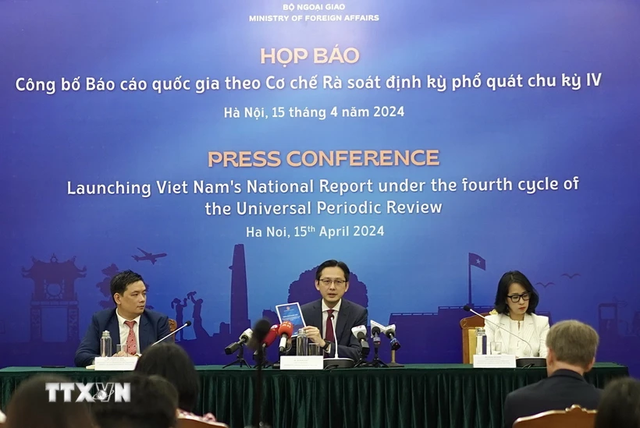Viet Nam gains achievements in promoting human rights
VGP - Viet Nam's National Report under the United Nations Human Rights Council (UNHRC)’s fourth cycle of the Universal Periodic Review (UPR) mechanism highlights the nation’s development achievements in various sectors.

Press conference launching Viet Nam's National Report under the fourth cycle of the Universal Periodic Review, Ha Noi, April 15, 2024 - Photo; VNA
The report was announced at an international press conference that took place in Ha Noi on April 15.
Speaking at the event, Deputy Minister of Foreign Affairs Do Hung Viet said, among the 241 recommendations accepted in the third cycle, Viet Nam has successfully fulfilled 209, accounting for 86.7 percent; partially met 30 others, or 12.4 percent. Two others are slated for fulfillment at an appropriate time.
From 2019-November 2023, the nation continued its efforts to build a rule-of-law state with the adoption of 44 laws, many of them are significant in terms of human and civil rights.
The country also joined the International Labor Organization (ILO)'s Right to Organize and Collective Bargaining Convention No.98 and ILO's Abolition of Forced Labor Convention No. 105.
Viet Nam also engaged in negotiations and formally joined the Global Compact for Safe, Orderly and Regular Migration (GCM).
Since 2009, its GDP per capita has increased by 25 percent while the poverty rate has been decreasing by 1.5 percent annually. Health insurance coverage has risen from over 81 percent in 2016 to 92 percent in 2022.
The rate of households using clean water has reached 98.3 percent, up nearly 1 percentage point compared to 2018.
As of September 2023, there were 78 million Internet users in Viet Nam, which marked a 21 percent growth from 2019. The number of mobile broadband subscriptions reached 86.6 million, up 38 percent from 2019.
About 72,000 associations are actively operating in Viet Nam, playing a significant role in addressing key socio-economic issues.
UPR is one of the most important mechanisms of the UNHRC. Its role is to review the human rights situation in all UN member states and thereby foster the full enforcement of their human rights obligations based on the principles of dialogue, equal cooperation, objectivity and transparency./.

